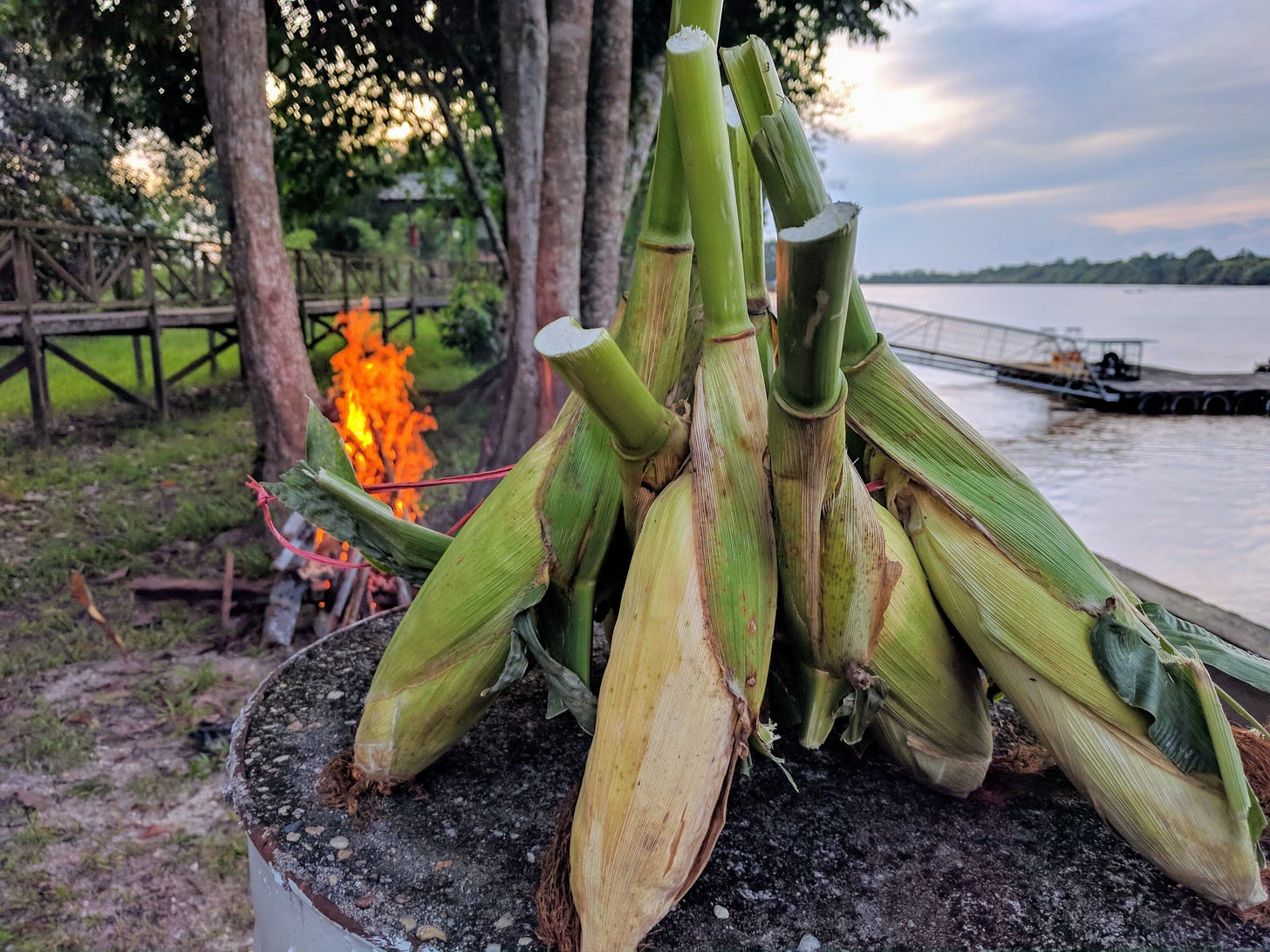Christmas of 2018, I said yes to all the spicy foods.
Our tradition when we lived in Indonesia was to visit as many Indonesian friends as possible for their Christmas meals. As is customary, we’d be invited to at least eight elaborate meals in one day, only to receive more generous invitations the next day. I quickly learned the art of popping in, eating a quick, small bite, and minutes later, ushering my kids to the next house.
But that Christmas, I lingered. I feasted. I was desperate to make every moment last forever.
Really enjoy your holidays with your friends this year, an American friend had advised me.
She knew we’d just finished our most intense whistleblowing week with our managers with Mission Aviation Fellowship.
A week later, we tried to make New Year’s Eve special too. We met friends by the river on the humid 90-degree evening to roast corn together. Indonesia celebrates three New Years each year—one with fireworks at midnight Jan. 1, another a few weeks later with a dancing, fortune-spreading lion barongsai for Chinese New Year, and yet another with a feast and prayers for Muslim New Year.
“Three chances for a fresh start. I like this country,” I wrote for MAF’s website that year.
As we began 2019, I longed for healthy change in our rapidly disintegrating relationship with our managers so that we could provide safe flight service to remote Indonesian communities. I cryptically shared my hope in my quarterly piece that month for MAF.
“This year, I really wanted all the hope that turning a page promises,” I wrote. “I spent time praying and reflecting. I came up with a ‘word of the year.’ And I considered a couple of resolutions.”
But would it be enough?
My friend who advised me to enjoy the holidays wasn’t just saying we should enjoy a chance for a break. She knew our attempts to report various safety and possible abuse concerns hadn’t gone well. She knew we were worried our managers now saw us as threats. And she guessed what I just didn’t want to admit. Christmas 2018 would likely be our last one in Indonesia.
In fact, the start of 2019 was the beginning of a devastating end of our 14 years there. By Easter, we were on a plane to the United States.
But not everything ended that year. Something important to me grew stronger.
Can whistleblowers survive New Year’s?
The whistleblower journey is filled with so many endings—endings of jobs, relationships, trust, innocence, hope, and avenues to be heard. And many of the beginnings we experience are unexpected, unwanted, traumatizing, and lonely.
As friends around you ring in a celebratory new year with clear goals, you may be feeling out of step with the revelry. Your past year may have been filled with trauma, betrayal, bewilderment, and injustice. And as you face the new year, you may carry so much grief, questions, and uncertainty that coming up with clear goals seems impossible. Do you keep trying to speak up? What will happen if you do? What will happen if you don’t?
Also, as your friends make resolutions about their own lives, bodies, and futures, your own hope for change in your organization is largely out of your control.
You may also carry existential questions into the new year. How did you even get to this point? What does it all mean? Some questions come from a place of intense fracturing. Without the community or job you just lost, who are you now?
An entire section of academic research has tried to answer that last question: Who are whistleblowers? Are men or women, leaders or subordinates, new members with fresh eyes or long-term employees more likely to speak up? Is there a whistleblower personality? Or as researchers Janet Near and Marcia Miceli asked in 1987, are whistleblowers reformers or dissidents?1
Much of the research on whistleblowers’ most common identities and circumstances is conflicting and inconclusive, Janet Near told me in a Zoom interview.
Near, who spent the most of her career researching whistleblowing, explained one reason for this question.
“Managers often want to say, ‘There's a whistleblowing personality. We're going to find those people and we're not going to hire them, or we're going to get rid of them,’” Near told me.
But I also think whistleblowers are so frequently told they’re divisive and disgruntled, they long for clarity. Is it true? Is something wrong with them?
A 2001 study provided one key clue to whistleblowers’ mindsets. Researchers found that whistleblowers have strong “self-efficacy,” or confidence that they can be successful in taking action.2
In a word, whistleblowers have hope.
A 2010 study found that people with strong personalities tend to have what it takes to push through companies’ manipulative impression-management strategies to speak truth.3
Simply put, whistleblowers are proactive.
A 2011 survey by the Ethics Resource Center discovered whistleblowers’ likely motivations. Those who reported abuse outside their organization did so to prevent harm to others.4
Whistleblowers speak up because they care.
The wrong place at the wrong time
I began 2024 with a resolution to start this substack, with only five email addresses of people—mostly family—who said they were willing to subscribe. I didn’t know exactly where it would lead or what I’d write. I enter journalistic investigations allowing my questions to lead the way. In this case, I allowed one central curiosity to guide me: a desire to understand the heart behind whistleblowing. I’d both experienced and observed the brutal costs of whistleblowing. And I wondered, why were so many loyal employees so quickly demonized once they challenged their leaders? And why did they speak up anyway?
I kept a computer folder where I collected academic studies on the topic. I interviewed whistleblowers. And I wrestled with whether to share details of my own unfolding story publicly.
On one hand, I try to remain a neutral, outsider journalist reporting on others’ firsthand experiences with reporting abuse. But I’ve also been a scared whistleblower trying to find the courage to speak up. Could I juggle these two roles well by speaking about both in one space?
In one particularly unexpected way this past year, the roles intersected. The week that I’d planned to publish a substack newsletter documenting my troubling experience with attorney Theresa Sidebotham, news broke that the International House of Prayer-Kansas City had hired her to help with a scandal on which I’d been reporting for months as a journalist.
Though the intersection felt too close for comfort, it also revealed a sad reality. Evangelical Christianity is a small world with systemically broken patterns of abuse response. It also reminded me that we’re all trying to ethically juggle roles and responsibilities as both whistleblowers and members of other professions and communities.
“Basically, whistleblowers are employees who are in the wrong place at the wrong time, that is, they have the opportunity to observe wrongdoing, often because of the nature of their jobs,” Near and Miceli wrote in their research.5
Those who speak up are “reformers” who see themselves as “loyal” employees who just want to make things better, this 1974 paper found.6 A 1986 essay termed it “principled dissent.”7 Similarly, whistleblowers are “ethical resisters,” professors Myron and Penina Glazera wrote.8
The perfect word
As I began 2019, I knew regular goals and a simple word of the year like “grow” or “rest” or “imagine” wouldn’t be enough to get us through another year. But I wasn’t thinking in terms of noble ideas like “reform” or “ethical resistance” for what my husband and I were doing. I was just fighting to do more life and ministry with my Indonesian friends in a healthy way. The chance to eat more spicy food was an extra perk.
But six years later, I know I possessed something then for which I didn’t yet know the name. It’s something that has been growing in me—and likely you, too. It can guide anyone who has stumbled into a whistleblower journey full of painful endings and unexpected beginnings. It combines whistleblowers’ hope, proactive spirits, and care for others.
Most importantly, it’s something whistleblowers have that no one can take away: Resolution.
Your whistleblower resolve is worth celebrating this week and in the many months to come. Happy New Year!
(Disclaimer: This is my own personal opinion intended as general educational information and not meant to replace legal or psychological advice for your specific situation. The opinions of people I interview are theirs.)
Janet Near, Marcia Miceli, “Whistle-blowers in organizations: Dissidents or reformers?” Research in Organizational Behavior, 1987.
Janet Near et. al. “Individual Differences and Whistle-blowing,” Academy of Management Annual Meeting Proceedings, 2001.
Brita Bjorkelo, “Predicting Proactive Behavior at Work: Exploring the Role of Personality as an Antecedent of Whistleblowing Behavior,” The Journal of Occupational and Organizational Psychology, 2010.
This 2011 survey found that 76 percent of people who blew the whistle externally (outside their company) did so to prevent harm to others. In contrast, for the instances in which whistleblowers could get monetary awards for such a step, money was the least likely motivator.
Marcia Micela, Janet Near, “Standing Up or Standing By: What Predicts Blowing the Whistle on Organizational Wrongdoing?” Research in Personnel and Human Resources Management, 2005.
Rory O’Day, “Intimidation Rituals: Reactions to Reform,” The Journal of Applied Behavioral Science, 1974.
J. W. Graham, “Principled Organizational Dissent: A Theoretical Essay,” Research in Organizational Behavior, 1986.
Myron Glazer, Penina Glazer, The Whistleblowers: Exposing Corruption in Government and Industry, 1989, chapter 1.







Yes, yes, yes. This was so helpful and timely to read. These exact questions have been heavy on my heart the past few weeks. Bless you in your journey, fellow traveler.
Thank you for this! ❤️
For those of us in the questioning phase of what we've just put into motion... this encouragement and reminder helps in so many ways.